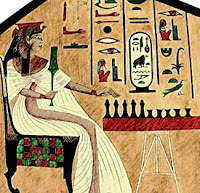I appreciate the in-your-face kind of allegory John Bunyan offers in "The Pilgrim's Progress." With names like Christian, Faithful, Fearful and Mistrust, battle weapons called All-Prayer, and places named "The Valley of the Shadow of Death," one need not expend too much effort decoding this allegory!
No wonder I found this book such an encouragement when I first started out on my Christian walk! It made me aware that I, too, was a pilgrim passing through this world, that this was not my home and that I now served a new King. Though the path was narrow and fraught with danger, the one who remained alert and steadfast would reach his eternal home and enter the presence of his King.
... at the bottom of the hill ... he saw three men with shackles on their feet. They were fast asleep a little distance off the pathway. The name of one was Simple, another was Sloth, and the third was named Presumption.
Upon seeing them lie in this state, Christian went to them (if by chance he might awaken them) and cried, "You're like those who sleep on the top of the rigging, for the Dead Sea is under you, a gulf that has no bottom. Wake up, then, and leave here! If you desire, I'll help you rid yourselves of your shackles." He also told them, "If he who prowls around like a roaring lion comes by, he will certainly devour you."
With that, they looked up at him and began to reply in this manner:
"I see no danger," said Simple.
"Just a little more sleep," replied Sloth.
Presumption ended with, "Every tub must stand upon its own bottom."
So they lay down to sleep again, and Christian continued on his way.
What good it did me to understand that I was on no easy pathway, that there would be struggles, fears, temptations, failures, as well as encouragements and God's daily provision during my own walk to the Celestial City. It set my heart to perseverance & reliance upon God along the way. I recommend the book to every new believer, lest they become lulled into the expectation of an easy journey, one without trials, without fears, without deprivations, without attack by the Enemy's forces.
Reading it again all these years later, different things capture my notice. I pine for the family that is left behind.
I told them what God had shown me concerning the destruction of our city. But I appeared to them to be like a mocker, and they didn't believe me... my wife was afraid of losing this world, and my children were carried away with the foolish delights of youth.And I grieve for the companions who start out on the walk with Christian, but turn back when the way becomes difficult and not to their liking...
Pliable began to be offended and angrily said to his companion, "Is this the happiness you've been telling me about all this time? If we make such poor progress at the beginning of our travel, what can we expect between here and our journey's end? If I get out (of the Swamp of Despond) alive, you will enter the fine country without me!Whether newly saved or down the road a pace, I highly recommend spending time in this classic. L. Edward Hazelbaker's translation into modern English leaves you without excuse! Immerse yourself in the book Christians have read and profited from since it was first published in 1678.
... they were strangers and exiles on the earth. For those who say such things make it clear that they are seeking a country of their own. And indeed if they had been thinking of that country from which they went out, they would have had opportunity to return. But as it is, they desire a better country, that is, a heavenly one. Therefore God is not ashamed to be called their God; for He has prepared a city for them. [Hebrews 11:13-16]

























